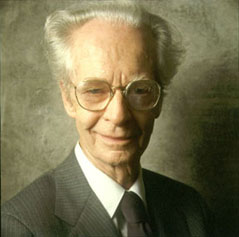| B. F. Skinner  AKA Burrhus Fredric Skinner AKA Burrhus Fredric Skinner
Born: 20-Mar-1904
Birthplace: Susquehanna, PA
Died: 18-Aug-1990
Location of death: Cambridge, MA
Cause of death: Cancer - Leukemia
Remains: Buried, Mount Auburn Cemetery, Cambridge, MA
Gender: Male
Religion: Atheist
Race or Ethnicity: White
Sexual orientation: Straight
Occupation: Psychologist, Philosopher Nationality: United States
Executive summary: Radical Behaviorism B. F. Skinner was one of the most influential of American psychologists. A radical behaviorist, he developed the theory of operant conditioning -- the idea that behavior is determined by its consequences, be they reinforcements or punishments, which make it more or less likely that the behavior will occur again. His principles are still incorporated within treatments of phobias, addictive behaviors, and in the enhancement of classroom performance (as well as in computer-based self-instruction). Skinner believed that the only scientific approach to psychology was one that studied behaviors, not internal (subjective) mental processes. He denied the existence of a mind as a thing separate from the body, but he did not deny the existence of thoughts, which he regarded simply as private behaviors to be analyzed according to the same principle as publicly observed behaviors.
To further improve the objective scientific value of observed behaviors he invented the Skinner box, a small, soundproof chamber in which an animal could be isolated from all distractions and outside influences, responding only to the controlled conditions within the box. It is sometimes reported that that Skinner put his daughter Deborah into a Skinner Box in her early years. This is a confusion with his "baby tender" invention, which was an air-conditioned crib with see through walls. By Deborah's own account, her crib provided her a place to sleep and to remain warm without the rashes involved in being wrapped within numerous layers of clothes and blankets. Deborah slept in her novel crib until she was two and a half years old, and by all accounts grew up a happy, healthy, thriving child and is now a successful artist living in London.
In 1948, Skinner published his actual ideas on child-rearing in Walden Two, a fictional account of a behaviorist-created utopia in which carefree young parents stroll off to work or school while their little ones enjoy all the comforts of community-run, behaviorist-approved daycare. In 1971 he wrote Beyond Freedom and Dignity, which suggests that the concept of individual freedom is an illusion. Skinner later sought to unite the reinforcement of individual behaviors, the natural selection of species, and the development of cultures under the heading of The Selection by Consequences (1981), the first of a series of articles in the journal Science.
Skinner was heavily influenced by the work of John B. Watson as well as early behaviorist pioneers Ivan Pavlov and Edward Thorndike. He spent most of his professional life teaching at Harvard University (after 9 years in the psychology department at Indiana University). He died in 1990 of leukemia. Wife: Yvonne Blue (two daughters)
Daughter: Julie Skinner Vargas (professor of Educational Psychology, West Virginia University)
Daughter: Deborah Skinner Buzan (artist)
University: BA English, Hamilton College
University: MA Psychology, Harvard University (1930)
University: PhD Psychology, Harvard University (1931)
American Philosophical Society 1949
Lambda Chi Alpha Fraternity
Humanist of the Year 1972
Author of books:
The Behaviour of Organisms (1938, nonfiction)
Walden Two (1948, fiction)
Science and Human Behavior (1953, nonfiction)
Verbal Behavior (1957, nonfiction)
Beyond Freedom and Dignity (1971, nonfiction)
Requires Flash 7+ and Javascript.
Do you know something we don't?
Submit a correction or make a comment about this profile
Copyright ©2019 Soylent Communications
|